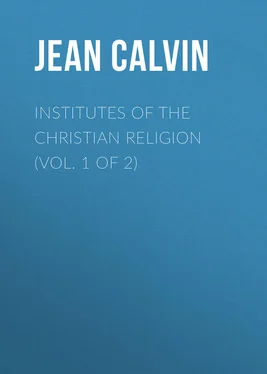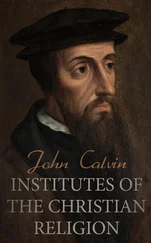Jean Calvin - Institutes of the Christian Religion (Vol. 1 of 2)
Здесь есть возможность читать онлайн «Jean Calvin - Institutes of the Christian Religion (Vol. 1 of 2)» — ознакомительный отрывок электронной книги совершенно бесплатно, а после прочтения отрывка купить полную версию. В некоторых случаях можно слушать аудио, скачать через торрент в формате fb2 и присутствует краткое содержание. Жанр: foreign_antique, foreign_prose, на английском языке. Описание произведения, (предисловие) а так же отзывы посетителей доступны на портале библиотеки ЛибКат.
- Название:Institutes of the Christian Religion (Vol. 1 of 2)
- Автор:
- Жанр:
- Год:неизвестен
- ISBN:нет данных
- Рейтинг книги:3 / 5. Голосов: 1
-
Избранное:Добавить в избранное
- Отзывы:
-
Ваша оценка:
- 60
- 1
- 2
- 3
- 4
- 5
Institutes of the Christian Religion (Vol. 1 of 2): краткое содержание, описание и аннотация
Предлагаем к чтению аннотацию, описание, краткое содержание или предисловие (зависит от того, что написал сам автор книги «Institutes of the Christian Religion (Vol. 1 of 2)»). Если вы не нашли необходимую информацию о книге — напишите в комментариях, мы постараемся отыскать её.
Institutes of the Christian Religion (Vol. 1 of 2) — читать онлайн ознакомительный отрывок
Ниже представлен текст книги, разбитый по страницам. Система сохранения места последней прочитанной страницы, позволяет с удобством читать онлайн бесплатно книгу «Institutes of the Christian Religion (Vol. 1 of 2)», без необходимости каждый раз заново искать на чём Вы остановились. Поставьте закладку, и сможете в любой момент перейти на страницу, на которой закончили чтение.
Интервал:
Закладка:
Jean Calvin
Institutes of the Christian Religion (Vol. 1 of 2)
Advertisement
The Presbyterian Board of Publication, in introducing to the public a new edition of the inimitable “Institutes of the Christian Religion,” do not wish to be regarded as adopting all the sentiments and forms of expression of the venerated writer; although they agree with him in his general views, and admire the skill and learning with which he has pointed out the relative positions and bearings of the great doctrines of revelation. Calvin was better qualified than any of his contemporaries, to present revealed truth in a connected and systematic form. His great natural abilities, his profound erudition, his well balanced and discriminating judgment, and his habits of diligent investigation, eminently fitted him to prepare such a work as the “Institutes,” in which the doctrines of the gospel are so clearly developed and harmonized, that the system has been closely associated with his name, from the period of its publication until the present time.
The honour of Calvin consisted, not in suggesting ingenious theories and speculations, but in his general accuracy in interpreting the Holy Scriptures, and in detecting and pointing out the connection of Scripture doctrines, which, instead of being insulated, were shown to occupy their respective places in forming a complete and perfect system of Divine truth. The doctrines embraced in the formularies of the Presbyterian Church are termed Calvinistic, from their general accordance with Calvin's interpretation of scriptural truth; but the admission of this term, as explanatory of their general character, is not understood as by any means implying an entire coincidence in the views of Calvin, or a submission to his authority as an umpire in theological controversies. Although a learned and pious, he was a fallible man; and his opinions, although deserving of profound respect, are not to be blindly followed.
While admitting that the “Institutes,” considering the times and circumstances in which they were written, form an invaluable body of divinity, still it must be acknowledged, that some of the doctrines therein maintained have been more luminously set forth in modern times. We would especially mention as an instance the doctrine of justification through the imputed righteousness of Christ. Some of the expressions of Calvin on the subject of reprobation may be regarded as too unqualified, and we can no further endorse them than as they are incorporated in the Presbyterian Confession of Faith. The most decidedly objectionable feature in the “Christian Institutes,” is to be found in the explanation of the Fourth Commandment, where the author asserts the abrogation of the Sabbath. In Calvin's view, this ordinance was a mere type of better blessings, and, with the types and ceremonies of the old dispensation, was done away by the introduction of a new and better dispensation. In this opinion there can be no doubt that he greatly erred; and so universal is the conviction of the Church on the perpetual obligation of the Sabbath as a moral institution, that no danger is to be apprehended from a contrary view, even under the sanction of so great a name as that of Calvin. In justice to his opinion on this subject, however, it should be stated, that he distinctly recognized not only the propriety but the necessity of a consecration of stated days for public religious services, without which regulation, he declares that “it is so far from being possible to preserve order and decorum, that if it were abolished, the Church would be in imminent danger of immediate convulsion and ruin.” It is much to be lamented that so great a mind should have been led astray on so important a point by attempting to avoid an opposite extreme.
The Board of Publication have been induced to undertake this edition, by the very generous offer of the First and Second Presbyterian Churches in Baltimore, of which the Rev. John Backus and the Rev. Dr. R. J. Breckinridge are respectively Pastors, to defray the expense of stereotyping the work. Under the direction of the Executive Committee of the Board, the translation has been diligently compared throughout with the original Latin and French, and various corrections have been made to convey the meaning of the author more distinctly and accurately. This laborious duty has been performed by a member of the Publishing Committee. The intrinsic excellence of the work, taken in connection with the attractive style, and comparative cheapness, of the present edition, induces the Committee to hope, that it may be widely circulated and carefully studied, both by the clergy and laymen of the Presbyterian Church.
In behalf of the Executive Committee,
William M. Engles, Editor.
The Translator's Preface
The English Reader is here presented with a translation of one of the principal theological productions of the sixteenth century. Few persons, into whose hands this translation is likely to fall, will require to be informed that the Author of the original work was one of an illustrious triumvirate, who acted a most conspicuous part in what has been generally and justly denominated The Reformation. Of that important revolution in ecclesiastical affairs, so necessary to the interests of true religion, and productive of such immense advantages even to civil society, Luther, Zuingle, and Calvin, were honoured, by the providence of God, to be the most highly distinguished instruments. It is no degradation to the memory of the many other ornaments of that age, to consider them as brilliant satellites in the firmament of the Church, revolving round these primary luminaries, to whom they were indebted for much of that lustre which they diffused over the earth; while they were all together revolving around one and the same common centre, though, it must be confessed, with considerable varieties of approximation, velocity, and obliquity in their courses; yet all deriving more or less copious communications of light from the great Sun of the moral system, the true Light of the world.
Differing in the powers of their minds, as well as in the temperament of their bodily constitutions, placed in different circumstances, and called to act in different scenes, these leading Reformers, though engaged in the same common cause, displayed their characteristic and peculiar excellences; which, it is no disparagement of that cause to admit, were likewise accompanied by peculiar failings. It is not the design of this preface to portray and discriminate their respective characters. They alike devoted their lives and labours to rescue Christianity from the absurdities, superstitions, and vices by which it had been so deplorably deformed, mutilated, and obscured, and to recall the attention of mankind from the doubtful traditions of men to the unerring word of God. But while they were all distinguished Reformers, Calvin has been generally acknowledged to have been the most eminent theologian of the three.
Such was the superiority of the talents and attainments of Calvin to those of most other great men, that the strictest truth is in danger of being taken for exaggeration. It is impossible for any candid and intelligent person to have even a slight acquaintance with his writings, without admiring his various knowledge, extensive learning, profound penetration, solid judgment, acute reasoning, pure morality, and fervent piety.
His Commentaries on the Scriptures have been celebrated for a juster method of exposition than had been exhibited by any preceding writer. Above a hundred years after his death, Poole, the author of the Synopsis, in the preface to that valuable work, says, “Calvin's Commentaries abound in solid discussions of theological subjects, and practical improvements of them. Subsequent writers have borrowed most of their materials from Calvin, and his interpretations adorn the books even of those who repay the obligation by reproaching their master.” And nothing can more satisfactorily evince the high estimation to which they are still entitled from the biblical student, than the following testimony, given, after the lapse of another century, by the late learned Bishop Horsley: “I hold the memory of Calvin in high veneration: his works have a place in my library; and in the study of the Holy Scriptures, he is one of the commentators whom I frequently consult.”
Читать дальшеИнтервал:
Закладка:
Похожие книги на «Institutes of the Christian Religion (Vol. 1 of 2)»
Представляем Вашему вниманию похожие книги на «Institutes of the Christian Religion (Vol. 1 of 2)» списком для выбора. Мы отобрали схожую по названию и смыслу литературу в надежде предоставить читателям больше вариантов отыскать новые, интересные, ещё непрочитанные произведения.
Обсуждение, отзывы о книге «Institutes of the Christian Religion (Vol. 1 of 2)» и просто собственные мнения читателей. Оставьте ваши комментарии, напишите, что Вы думаете о произведении, его смысле или главных героях. Укажите что конкретно понравилось, а что нет, и почему Вы так считаете.












